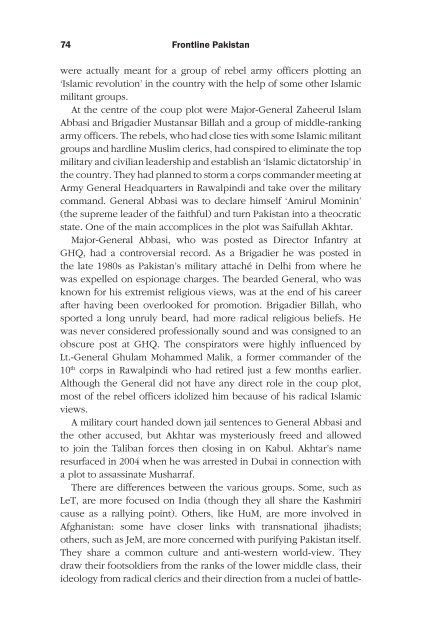Frontline Pakistan : The Struggle With Militant Islam - Arz-e-Pak
Frontline Pakistan : The Struggle With Militant Islam - Arz-e-Pak
Frontline Pakistan : The Struggle With Militant Islam - Arz-e-Pak
Create successful ePaper yourself
Turn your PDF publications into a flip-book with our unique Google optimized e-Paper software.
<strong>Frontline</strong> <strong><strong>Pak</strong>istan</strong><br />
were actually meant for a group of rebel army officers plotting an<br />
‘<strong>Islam</strong>ic revolution’ in the country with the help of some other <strong>Islam</strong>ic<br />
militant groups.<br />
At the centre of the coup plot were Major-General Zaheerul <strong>Islam</strong><br />
Abbasi and Brigadier Mustansar Billah and a group of middle-ranking<br />
army officers. <strong>The</strong> rebels, who had close ties with some <strong>Islam</strong>ic militant<br />
groups and hardline Muslim clerics, had conspired to eliminate the top<br />
military and civilian leadership and establish an ‘<strong>Islam</strong>ic dictatorship’ in<br />
the country. <strong>The</strong>y had planned to storm a corps commander meeting at<br />
Army General Headquarters in Rawalpindi and take over the military<br />
command. General Abbasi was to declare himself ‘Amirul Mominin’<br />
(the supreme leader of the faithful) and turn <strong><strong>Pak</strong>istan</strong> into a theocratic<br />
state. One of the main accomplices in the plot was Saifullah Akhtar.<br />
Major-General Abbasi, who was posted as Director Infantry at<br />
GHQ, had a controversial record. As a Brigadier he was posted in<br />
the late 1980s as <strong><strong>Pak</strong>istan</strong>’s military attaché in Delhi from where he<br />
was expelled on espionage charges. <strong>The</strong> bearded General, who was<br />
known for his extremist religious views, was at the end of his career<br />
after having been overlooked for promotion. Brigadier Billah, who<br />
sported a long unruly beard, had more radical religious beliefs. He<br />
was never considered professionally sound and was consigned to an<br />
obscure post at GHQ. <strong>The</strong> conspirators were highly influenced by<br />
Lt.-General Ghulam Mohammed Malik, a former commander of the<br />
10 th corps in Rawalpindi who had retired just a few months earlier.<br />
Although the General did not have any direct role in the coup plot,<br />
most of the rebel officers idolized him because of his radical <strong>Islam</strong>ic<br />
views.<br />
A military court handed down jail sentences to General Abbasi and<br />
the other accused, but Akhtar was mysteriously freed and allowed<br />
to join the Taliban forces then closing in on Kabul. Akhtar’s name<br />
resurfaced in 2004 when he was arrested in Dubai in connection with<br />
a plot to assassinate Musharraf.<br />
<strong>The</strong>re are differences between the various groups. Some, such as<br />
LeT, are more focused on India (though they all share the Kashmiri<br />
cause as a rallying point). Others, like HuM, are more involved in<br />
Afghanistan: some have closer links with transnational jihadists;<br />
others, such as JeM, are more concerned with purifying <strong><strong>Pak</strong>istan</strong> itself.<br />
<strong>The</strong>y share a common culture and anti-western world-view. <strong>The</strong>y<br />
draw their footsoldiers from the ranks of the lower middle class, their<br />
ideology from radical clerics and their direction from a nuclei of battle-













